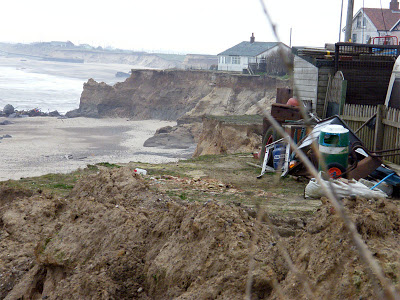We only have to look across the Channel to the Netherlands to see how to protect a coastline properly.
Thanks to a team of underwater archaeologists from the University of Southampton, we should soon be able to sense the bustle of medieval Dunwich. At the current rate it won’t be too long before the archaeologists are called to do the same for Norwich.
In April the Government’s nature quango, Natural England, revealed that it is thinking of letting the sea reclaim 25 square miles, and six villages, of Norfolk.
The story of Dunwich, or rather a misreading of the story, is frequently cited as justification for the Government’s policy of abandoning sea defences – or “coastal realignment”, as it is euphemistically described. Look at Dunwich, goes the argument, to see the futility of trying to hold back the waves.
In fact, the story of Dunwich is far more complex than that. The burghers of Dunwich, whose skulls still occasionally wash ashore, were not fools. Had the same efforts been put into defending Dunwich as have been put into defending Portsmouth, Felixstowe or any other great port that would be submerged were it not for sea defences, it would still be a large town today. It was allowed to fall into the sea because the silting-up of the docks ruined its economy and made it not worth defending.
The wealth of medieval Dunwich was reliant on its harbour on the Dunwich river. Long before the great storm of 1287, which caused the collapse of a stretch of cliff, the river had been blocked by a spit of land called the Kingsholme and diverted three miles to the north, to join the River Blyth. Dunwich gradually declined because at that point Walberswick and Southwold became much more attractive ports.
Had Dunwich survived, it would probably by now be hosting ferries to the Netherlands. There you can see what happens when a government really puts its mind to defending the coastline. Millions live quite happily on land that in places lies 15ft below sea level. There is no talk of abandoning Rotterdam; just great vigilance and superb engineering.
 The difference between the polders and our crumbling cliffs and creeping saltmarshes is not that the North Sea is wilder on our side. It is that our Government is tight-fisted on flood defence, spending just £470 million a year on rivers and coasts across the whole country – compared with £9 billion on the Olympics.
The difference between the polders and our crumbling cliffs and creeping saltmarshes is not that the North Sea is wilder on our side. It is that our Government is tight-fisted on flood defence, spending just £470 million a year on rivers and coasts across the whole country – compared with £9 billion on the Olympics.
Moreover, in the Netherlands the business of coastal defence is in the hands of civil engineers, whereas in Britain it has been trusted to a bunch of birdwatchers who see the defence of property as less important than creating homes for warblers.
Either we take Natural England and the Environment Agency off the job or the story of Dunwich will become the story of the whole of the East of England.
Ross Clark – www.timesonline.co.uk









